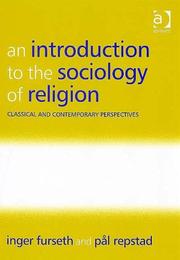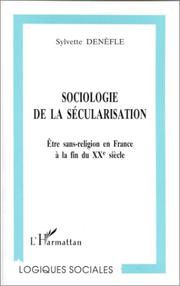| Listing 1 - 10 of 917 | << page >> |
Sort by
|
Book
ISBN: 8897523188 889752317X Year: 2012 Publisher: Turin, Italy : Accademia University Press,
Abstract | Keywords | Export | Availability | Bookmark
 Loading...
Loading...Choose an application
- Reference Manager
- EndNote
- RefWorks (Direct export to RefWorks)
"Possiamo parlare di interessi propriamente religiosi (definiti ancora in termini generici) quando, accanto alle domande magiche che sempre sussistono, almeno in certe classi, fa la sua comparsa anche una domanda propriamente ideologica, vale a dire l'aspettativa di un messaggio sistematico capace di conferire un senso unitario alla vita, proponendo ai propri destinatari privilegiati una visione coerente del mondo e dell'esistenza umana e dando loro i mezzi per realizzare l'integrazione sistematica della loro condotta quotidiana, quindi capace di fornire loro delle giustificazioni del fatto di esistere come esistono, ovvero in una posizione sociale determinata. Se ci sono delle funzioni sociali della religione e se, di conseguenza, la religione è passibile di analisi sociologica, è perché i laici non si aspettano - o non solamente - delle giustificazioni di esistere atte a strapparli dall'angoscia esistenziale della contingenza e dell'abbandono, oppure alla miseria biologica, alla malattia, alla sofferenza o alla morte, ma anche e soprattutto delle giustificazioni sociali di esistere come occupanti di una posizione determinata nella struttura sociale" (Pierre Bourdieu, 1930-2002).
Religion and sociology. --- Religion and society --- Religious sociology --- Society and religion --- Sociology, Religious --- Sociology and religion --- Sociology of religion --- Sociology
Book
ISBN: 3793009262 Year: 1974 Publisher: Freiburg
Abstract | Keywords | Export | Availability | Bookmark
 Loading...
Loading...Choose an application
- Reference Manager
- EndNote
- RefWorks (Direct export to RefWorks)
Religion and sociology --- Religion and society --- Religious sociology --- Society and religion --- Sociology, Religious --- Sociology and religion --- Sociology of religion --- Sociology

ISBN: 1138468312 1315262649 128109790X 9786611097905 075468251X 9780754682516 9780754656531 0754656535 9780754656586 0754656586 0754656535 0754656586 1351958666 Year: 2006 Publisher: Aldershot, England Burlington, VT Ashgate
Abstract | Keywords | Export | Availability | Bookmark
 Loading...
Loading...Choose an application
- Reference Manager
- EndNote
- RefWorks (Direct export to RefWorks)
An Introduction to the Sociology of Religion provides an overview of sociological theories of contemporary religious life. Some chapters are organized according to topic. Others offer brief presentations of classical and contemporary sociologists from Karl Marx to Zygmunt Bauman and their perspectives on social life, including religion. Throughout the book, illustrations and examples are taken from several religious traditions.
Religion and sociology. --- Religion and society --- Religious sociology --- Society and religion --- Sociology, Religious --- Sociology and religion --- Sociology of religion --- Sociology
Book
ISBN: 1844655350 1317547357 9781317547358 9781317547341 1317547349 9781315729916 1315729911 9781317547334 1317547330 9781138159068 1138159069 9781844655342 1844655342 Year: 2012 Publisher: Durham : Acumen Publishing,
Abstract | Keywords | Export | Availability | Bookmark
 Loading...
Loading...Choose an application
- Reference Manager
- EndNote
- RefWorks (Direct export to RefWorks)
Progressive, modern societies hold the promise of the triumph of reason and the banishing of primitive, religious impulses to a bygone age. If this statement is orthodoxy to much of Western liberal thought, then Gordon Lynch's On the Sacred is heresy. Challenging the myth of the idealized rational society, Lynch argues that emotionally-charged forms of the sacred remain an inevitable foundation of social life. Modernity has not rid us of the sacred, but merely presented us with new sacred forms focused around humanity, nature and the nation. Drawing on examples from the changing status of the British monarchy, the growing influence of humanitarian NGOs and moral justifications for the invasion of Iraq, On the Sacred presents a compelling account of what the sacred is and why it still matters for us today. By the end of the book, Lynch calls us to a new understanding of our moments of deep moral certainty, challenging us to think about the harm we do in the name of what we call sacred.
Religion and sociology. --- Religion and society --- Religious sociology --- Society and religion --- Sociology, Religious --- Sociology and religion --- Sociology of religion --- Sociology
Book
ISBN: 8024632667 9788024632667 9788024628820 Year: 2016 Publisher: V Praze
Abstract | Keywords | Export | Availability | Bookmark
 Loading...
Loading...Choose an application
- Reference Manager
- EndNote
- RefWorks (Direct export to RefWorks)
Religion and sociology. --- Religion and society --- Religious sociology --- Society and religion --- Sociology, Religious --- Sociology and religion --- Sociology of religion --- Sociology
Book
ISBN: 1447303199 128207072X 9786612070723 1847423639 1847420419 Year: 2008 Publisher: Bristol, UK : Policy Press,
Abstract | Keywords | Export | Availability | Bookmark
 Loading...
Loading...Choose an application
- Reference Manager
- EndNote
- RefWorks (Direct export to RefWorks)
A growing number of people are claiming or reclaiming a religious or spiritual identity for themselves. Yet, in contemporary Western societies, the frameworks of understanding that have developed within the social science disciplines, and which are used to analyse data, are secular in nature, and so may be inappropriate for investigating some aspects of religion, spirituality and faith and how these intersect with individuals' lives. This edited collection addresses important theoretical and methodological issues to explore ways of engaging with religion and spirituality when carrying out social science research. Divided into three sections, the book examines the notion of secularism in relation to contemporary western society, including a focus upon secularisation; explores how the values underpinning social scientific enquiry might serve to marginalise religion and spirituality; and reflects on social science research methodologies when researching religion and spirituality. With international contributions from key academics in the fields of religious studies, cultural studies, political science, criminology, sociology, health and social policy, this engaging book will provide social science students, educators, researchers and practitioners with an essential overview of key debates around secularism, faith, spirituality and social science research.
Religion and sociology. --- Religion and society --- Religious sociology --- Society and religion --- Sociology, Religious --- Sociology and religion --- Sociology of religion --- Sociology
Book
ISBN: 9783038420187 Year: 2015 Publisher: Basel, Switzerland : MDPI - Multidisciplinary Digital Publishing Institute,
Abstract | Keywords | Export | Availability | Bookmark
 Loading...
Loading...Choose an application
- Reference Manager
- EndNote
- RefWorks (Direct export to RefWorks)
The study of religion as an academic discipline is a rather recent development in colleges and universities in the United States and abroad. Although French sociologist Émile Durkheim wrote extensively about the role of religion in public life in the early 1900s, it was not until the 1960s that researchers from social science backgrounds, predominately sociology, began the formal, empirical study of religion as a social force that may impact a wide range of individual and societal outcomes. This special issue of Religions brings together scholars from around the world who use diverse methodologies to study the impact of religion on a broad range of outcomes. The issue thus provides a unique snapshot of current work being done in the sociology of religion. In these 18 articles, readers will find a great mix of data-driven studies (both quantitative and qualitative) and conceptual/review papers. The articles also reflect a diversity of authors, locations, topics, and faith traditions. Many of the papers include undergraduate and graduate students as co-authors. These collaborations are important for maintaining the continuity of high-quality research over time.
Religion and sociology. --- Religion and society --- Religious sociology --- Society and religion --- Sociology, Religious --- Sociology and religion --- Sociology of religion --- Sociology
Book
ISBN: 3658411473 3658411465 9783658411473 Year: 2023 Publisher: Wiesbaden, Germany : Springer VS,
Abstract | Keywords | Export | Availability | Bookmark
 Loading...
Loading...Choose an application
- Reference Manager
- EndNote
- RefWorks (Direct export to RefWorks)
In diesem Open-Access-Buch unterzieht Anastas Odermatt die weitverbreitete Annahme, dass sowohl Religion als auch freiwilliges Engagement förderlich für soziales Vertrauen und damit für gesellschaftlichen Zusammenhalt und Demokratie seien, einer empirischen Überprüfung. Wirkt Religion eher konflikthaft und negativ auf unsere Gesellschaft oder wirkt sie eher brückenbildend, stabilisierend und damit positiv? Diese Frage wird in Wissenschaft und Öffentlichkeit kontrovers diskutiert und unterschiedlich beantwortet. Basierend auf den Daten des KONID Survey 2019 für die Schweiz werden die Wirkmechanismen zwischen Religion und Religiosität, freiwilligem Engagement und sozialem Vertrauen in der Schweiz vertieft untersucht und allgemein verständlich erklärt. Dabei ergibt sich ein differenziertes Bild für die unterschiedlichen, teils eigenwilligen Zusammenhänge - neue Erkenntnisse und einige Überraschungen miteingeschlossen.
Religion and sociology. --- Religion and society --- Religious sociology --- Society and religion --- Sociology, Religious --- Sociology and religion --- Sociology of religion --- Sociology
Periodical
Abstract | Keywords | Export | Availability | Bookmark
 Loading...
Loading...Choose an application
- Reference Manager
- EndNote
- RefWorks (Direct export to RefWorks)
Religion and sociology. --- Sociologie religieuse --- Sociologie. --- Religieuze aspecten. --- Religion and sociology --- Religion and society --- Religious sociology --- Society and religion --- Sociology, Religious --- Sociology and religion --- Sociology of religion

ISBN: 2738452949 9782738452948 Year: 1997 Publisher: Paris L'Harmattan
Abstract | Keywords | Export | Availability | Bookmark
 Loading...
Loading...Choose an application
- Reference Manager
- EndNote
- RefWorks (Direct export to RefWorks)
A la rencontre des Français qui se disent sans religion. Cette enquête explore leurs façons de penser le monde, le religieux, le métaphysique, l'axiologie, les valeurs sociales, pour tenter de mesurer si leurs choix sont le reflet d'un individualisme égaré hors de toute référence idéologique ou s'ils expriment une cohérence nouvelle, aboutissement d'un long processus de sécularisation.
Atheism --- Religion and sociology --- Athéisme --- Sociologie religieuse --- France --- --Société --- --Sécularisation --- --XXe s., --- --Sociology - Religious Culture --- Athéisme --- --France --- --Atheism --- Société --- Sécularisation --- XXe s., 1901-2000
| Listing 1 - 10 of 917 | << page >> |
Sort by
|

 Search
Search Feedback
Feedback About UniCat
About UniCat  Help
Help News
News